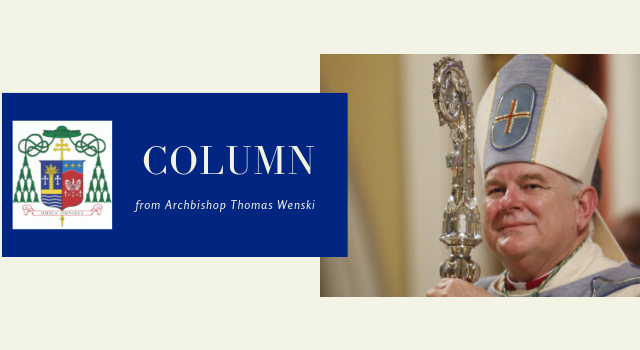By Archbishop Thomas Wenski - The Archdiocese of Miami
These days almost everybody knows about Ramadan — we might not know when it begins or ends but we know that during Ramadan, Muslims do fast and pray. And apparently, they do so quite intentionally and with appropriate seriousness of purpose.
Do we Catholics approach Lent with the same intentionality and seriousness?
As members of the Church, we are a pilgrim people who, as one prayer says, go about “mourning and weeping in this valley of tears.” Our journey through life takes us along hills and valleys; that is, through high points and low points. But pilgrims, given the difficulties of the trek, should travel light — without being encumbered with excess baggage. Lent, with its call to penance and repentance, is basically an invitation to lose the excess baggage of sin and vice.
The various practices of Lent — fasting, praying, mortifications and sacrifices — are not about punishing ourselves. Rather, by freeing us of the encumbrances of sin, they are about helping us to achieve the freedom that can help us practice at being our own best selves — to incline ourselves to do the right thing at the right time.
Indifference to our neighbor and to God describes pretty much our world today, marked with an increasingly self-absorbed individualism. Our “throw away” culture has led to the “globalization of indifference.” The plights of refugees, the marginalization of immigrants, the loneliness of the elderly, the hopelessness seen in too many young people, the fracturing of the family are all part of a long litany of “woes” that a globalized indifference has created; and they lead to an equally long list of evils that the world “tolerates” — genocide, euthanasia, drug addiction, abortion, to name just a few.
Lent, however, assumes that we know the difference between right and wrong, between good and evil. And so, Lent is not an invitation to engage in moral arguments or debates about why something is wrong or right; but rather, it is an invitation to look at ourselves with unflinching honesty during this special time of grace and in the light of the Gospel, to try to figure out why we choose wrongly, and learn what we must do to reverse course and choose rightly.
Thus, Lent is a way of checking our spiritual GPS — to make sure that with all the twists and turns of our life’s journey we are still going in the right direction. Lent reminds us that the true purpose of life is not to seek our glory but God’s glory, and that is found not through self-assertion or self-seeking but through self-giving and self-sacrificing.
The Catechism of the Catholic Church speaks of the corporal and spiritual works of mercy — these works of mercy can help remind us that we are not only to avoid sin as followers of Jesus Christ; we are also to do good.
At any rate, the traditional practices of Lent — more intense prayer, sacrifices and mortifications, almsgiving and other acts of charity — are all about teaching us to say “NO” to ourselves so that, freed from the slavery to our desires, we can say “YES” to God and to our neighbor in need.
If our Muslim brothers and sisters can observe Ramadan intentionally and with appropriate seriousness of purpose, we Catholics should approach Lent with equal intentionality and seriousness of purpose.

